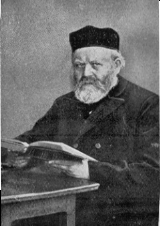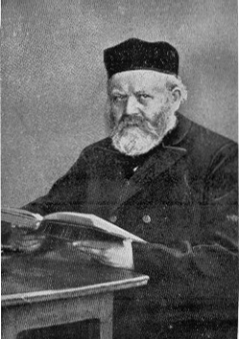
David Zvi Hoffman
Encyclopedia

Orthodox Judaism
Orthodox Judaism , is the approach to Judaism which adheres to the traditional interpretation and application of the laws and ethics of the Torah as legislated in the Talmudic texts by the Sanhedrin and subsequently developed and applied by the later authorities known as the Gaonim, Rishonim, and...
Rabbi
Rabbi
In Judaism, a rabbi is a teacher of Torah. This title derives from the Hebrew word רבי , meaning "My Master" , which is the way a student would address a master of Torah...
and Torah Scholar
Talmid Chacham
Talmid Chacham is an honorific title given to one well versed in Jewish law, in effect, a Torah scholar....
. Born in Verbó
Verbo
Verbo is a Spanish dark fantasy thriller film written and directed by Eduardo Chapero-Jackson.-Plot:A 15-year-old teenager, Sara, lives with an apparently normal suburban family. She develops a sixth sense and begins to perceive a series of disturbing messages and clues, which prompt her to enter a...
in 1843, he attended various Yeshiva
Yeshiva
Yeshiva is a Jewish educational institution that focuses on the study of traditional religious texts, primarily the Talmud and Torah study. Study is usually done through daily shiurim and in study pairs called chavrutas...
s in his native town before he entered the college at Pressburg
Bratislava
Bratislava is the capital of Slovakia and, with a population of about 431,000, also the country's largest city. Bratislava is in southwestern Slovakia on both banks of the Danube River. Bordering Austria and Hungary, it is the only national capital that borders two independent countries.Bratislava...
, from which he graduated in 1865. He then studied philosophy
Philosophy
Philosophy is the study of general and fundamental problems, such as those connected with existence, knowledge, values, reason, mind, and language. Philosophy is distinguished from other ways of addressing such problems by its critical, generally systematic approach and its reliance on rational...
, history, and Oriental languages at Vienna
Vienna
Vienna is the capital and largest city of the Republic of Austria and one of the nine states of Austria. Vienna is Austria's primary city, with a population of about 1.723 million , and is by far the largest city in Austria, as well as its cultural, economic, and political centre...
and Berlin
Berlin
Berlin is the capital city of Germany and is one of the 16 states of Germany. With a population of 3.45 million people, Berlin is Germany's largest city. It is the second most populous city proper and the seventh most populous urban area in the European Union...
, taking his doctor's degree in 1871 from University of Tübingen. His rabbinical training was at the hands of Maharam Schick and Azriel Hildesheimer
Azriel Hildesheimer
Esriel Hildesheimer was a German rabbi and leader of Orthodox Judaism. He is regarded as a pioneering modernizer of Orthodox Judaism in Germany and as a founder of Modern Orthodox Judaism.-Biography:...
.
Shortly after obtaining his degree, he became employed as a teacher in Samson Raphael Hirsch
Samson Raphael Hirsch
Samson Raphael Hirsch was a German rabbi best known as the intellectual founder of the Torah im Derech Eretz school of contemporary Orthodox Judaism...
's Realschule school in Frankfurt am Main, and in 1873 moved to Berlin to join the faculty of the Rabbinical Seminary of Berlin
Hildesheimer Rabbinical Seminary
The Hildesheimer Rabbinical Seminary was founded in Berlin on 22 October 1873 by Rabbi Dr. Azriel Hildesheimer for the training of rabbis in the tradition of Orthodox Judaism.-History:...
where he eventually became rector
Rector
The word rector has a number of different meanings; it is widely used to refer to an academic, religious or political administrator...
in 1899 after the death of Azriel Hildesheimer.
A selective Wissenschaft practitioner
David Hoffmann occupies a very interesting position in the Wissenschaft des JudentumsWissenschaft des Judentums
Wissenschaft des Judentums , refers to a nineteenth-century movement premised on the critical investigation of Jewish literature and culture, including rabbinic literature, using scientific methods to analyze the origins of Jewish traditions.-The Verein für Cultur und Wissenschaft der Juden:The ...
movement of the 19th century, as shown by , and is in some ways the prototype of the contemporary Orthodox Jewish scholar, facing the ubiquitous tension between faithfulness to tradition and the demands of critical inquiry. Though born in Hungary
Hungary
Hungary , officially the Republic of Hungary , is a landlocked country in Central Europe. It is situated in the Carpathian Basin and is bordered by Slovakia to the north, Ukraine and Romania to the east, Serbia and Croatia to the south, Slovenia to the southwest and Austria to the west. The...
, he adapted the German-Jewish approach of openness towards general culture, world and society. He employed the critical scientific method to the Talmud
Talmud
The Talmud is a central text of mainstream Judaism. It takes the form of a record of rabbinic discussions pertaining to Jewish law, ethics, philosophy, customs and history....
and wrote about the history of the development of the form of the Oral law (as opposed to the development of the Law itself, the latter being an enterprise antithetical to traditional Jewish beliefs; see below). Despite his worldly inclinations, he was an original member of the more traditionally oriented Moetzes Gedolei HaTorah
Moetzes Gedolei HaTorah
Moetzes Gedolei HaTorah refers to the supreme rabbinical policy-making council of any of several related Haredi Jewish organizations....
(council of great Torah sages), and was also known to be a person of great moral conduct and piety.
Hoffman was the leading authority on traditional Jewish Law (halacha) in Germany
Germany
Germany , officially the Federal Republic of Germany , is a federal parliamentary republic in Europe. The country consists of 16 states while the capital and largest city is Berlin. Germany covers an area of 357,021 km2 and has a largely temperate seasonal climate...
in his lifetime, an expert specifically in the area of Midrash halakha
Midrash halakha
Midrash halakha was the ancient Judaic rabbinic method of Torah study that expounded upon the traditionally received 613 Mitzvot by identifying their sources in the Tanakh , and by interpreting these passages as proofs of the laws' authenticity. Midrash more generally also refers to the...
(legalistic Biblical exegesis), and was also well known for his efforts to disprove the Documentary Hypothesis
Documentary hypothesis
The documentary hypothesis , holds that the Pentateuch was derived from originally independent, parallel and complete narratives, which were subsequently combined into the current form by a series of redactors...
as expressed by the Graf-Wellhausen
Julius Wellhausen
Julius Wellhausen , was a German biblical scholar and orientalist, noted particularly for his contribution to scholarly understanding of the origin of the Pentateuch/Torah ....
theory, his arguments being presented in a famous work entitled Die wichtigsten Instanzen gegen die Graf-Wellhausensche Hypothese (1903/1916). A. Altmann, however, sees Hoffmann's writings on these matters (though evidencing great expertise) as pure apologetics, the cause of which may be seen as laid out in his introduction to Leviticus
Leviticus
The Book of Leviticus is the third book of the Hebrew Bible, and the third of five books of the Torah ....
, where Hoffmann makes the following remarks:
Yet, despite the piety of the above sentiments, and his repeated proclamations regarding the divinity of the Oral Law, Hoffmann was still very much the Wissenschaft scholar. He cites in his work scholars such as Z. Frankel, A. Geiger, S.J. Rapoport, and H. Graetz, he studies the influences of Ancient Near Eastern culture on the evolution of the Talmud, and he identifies problems in the transmitted text. For example, Hoffmann in The First Mishna sees the present Mishna Avot
Avot
Avot may refer to:* Pirkei Avot, a tractate of the Mishna composed of ethical maxims of the Rabbis of the Mishnaic period* The Patriarchs : Abraham, Isaac and Jacob* Avot, Côte-d'Or, a commune in France...
as having been redacted from three different sources, a Mishna of Rabbi Akiva
Rabbi Akiva
Akiva ben Joseph simply known as Rabbi Akiva , was a tanna of the latter part of the 1st century and the beginning of the 2nd century . He was a great authority in the matter of Jewish tradition, and one of the most central and essential contributors to the Mishnah and Midrash Halakha...
, a Mishna of Rabbi Meir
Rabbi Meir
Rabbi Meir or Rabbi Meir Baal Hanes was a Jewish sage who lived in the time of the Mishna. He was considered one of the greatest of the Tannaim of the fourth generation . According to legend , his father was a descendant of the Roman Emperor Nero who had converted to Judaism. His wife Bruriah is...
, and a Mishna of Rabbi Judah Ha-Nasi, the originals of which cannot be completely reconstructed due to their thoroughgoing fusion and subsequent manipulation.
The extent to which Hoffmann resided in the Wissenschaft movement can also be seen from the criticism he received from such opponents of the movement as Samson Raphael Hirsch. Hildesheimer notes regarding Hirsch's opinion of his Rabbinical Seminary (where Hoffmann worked after leaving Hirsch's institution) that "a question certainly exists as to whether Rabbi Hirsch considers the seminary to be an Orthodox institution." Hirsch's opposition extended to Hoffmann's own work, judging Hoffmann's book Mar Samuel to contain heresies .
Hoffmann's resolution of this tension between faithfulness to tradition and textual criticism is found by in the following passage from the introduction to The First Mishna:
Writings
Some of Hoffman's works include Die Erste Mishna, The First Mishna, a historical and linguistic analysis of the MishnahMishnah
The Mishnah or Mishna is the first major written redaction of the Jewish oral traditions called the "Oral Torah". It is also the first major work of Rabbinic Judaism. It was redacted c...
and Melamed Le-ho'il, a responsa
Responsa
Responsa comprise a body of written decisions and rulings given by legal scholars in response to questions addressed to them.-In the Roman Empire:Roman law recognised responsa prudentium, i.e...
on contemporary issues based on historical evidence of tradition. He also published a commentary on the Pentateuch that included a translation of the text into German
German language
German is a West Germanic language, related to and classified alongside English and Dutch. With an estimated 90 – 98 million native speakers, German is one of the world's major languages and is the most widely-spoken first language in the European Union....
. Later this commentary was translated into Hebrew, though today it is out of print. Most of his writings were in German and remain so to this day. The First Mishna was translated into English, and a selection of his comments on the Passover Haggada have been published in Hebrew as well. He published a translation of two of the orders of the Mishna into German.
External links
- Jewish Encyclopedia entry on David Zvi Hoffmann, written by Isidore SingerIsidore SingerIsidore Singer was an editor of the Jewish Encyclopedia and founder of the American League for the Rights of Man.-Biography:...

